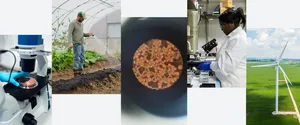13 NGOs tackling sustainability challenges in Asia Pacific

The Asia-Pacific region — particularly its low-lying and small island countries — is exceptionally vulnerable to the impacts of climate change, whether it be heat waves, rising sea levels or loss of biodiversity. It’s also home to many local organizations working hard to combat these effects and develop sustainability practices.
That’s why the Asian Venture Philanthropy Network (AVPN), the world’s largest network of social investors in Asia Pacific, set up the APAC Sustainability Seed Fund. Supported by Google.org and Asian Development Bank, the $3 million fund will be allocated between 13 local sustainability organizations helping vulnerable and underserved communities in the region.
"The climate crisis we face today demands urgent action and innovative solutions to help local communities adapt and mitigate risks,” says Naina Batra, CEO of AVPN. “By collaborating with these local changemakers, we can drive impactful change and bring Asia to the forefront of climate action.”
These are the 13 recipients of the APAC Sustainability Seed Fund:
Alam Sehat Lestari (ASRI) has supported community-designed solutions preserving over 100,000 hectares of critical rainforests in Indonesian Borneo. ASRI will use their funding to develop the Rainforest Exchange, a platform to provide more accurate and accessible information on forest and carbon loss — critical in the effort to fight deforestation.
Azure Alliance is committed to promoting clean water resources and maintaining pollution-free marine and freshwater ecosystems. They’re developing an unmanned autonomous vehicle to remove floating debris like plastic from harbors, lakes, ponds and waterways.
Border Green Energy Team focuses on providing renewable energy solutions and training to use them. They’re currently working to increase access to renewable energy for rural villages along the Thailand-Myanmar border.
Coalition for Our Common Future
Coalition for Our Common Future is a South Korea-based think tank and partnership platform, focusing on projects that will support the global target of achieving carbon neutrality and pushing for a more sustainable world. They’re working to create a data-driven platform that analyzes a project’s greenhouse gas reduction potential — which will help increase investments in renewable energy projects.
Engineering Good is a Singapore-based nonprofit that uses engineering and technology solutions to champion inclusivity for disadvantaged communities — whether it’s upcycling and donating devices to those without access to technology or creating low-cost assistive technologies for people with disabilities.
Mahila Housing Trust aims to develop an AI-enabled model for climate resilience that centers low-income women’s needs — designed after Amalner, Maharashtra to represent a small urban town in India. The tool will help shape the city planning process and ensure these women’s voices are heard and their needs are met.
Institute for Global Environmental Strategies
Institute for Global Environmental Strategies is an independent, nonprofit environmental policy think tank that aims to establish a closed island recycling system for plastic and other waste on Samet Island in Thailand.
Ocean Recovery Alliance is an NGO focused on creating innovative solutions and collaborations to improve the ocean’s health. They specifically plan to scale up the implementation of Global Alert, an online tool that allows you to report, rate and map plastic pollution levels in your watersheds.
TGECA focuses on energy inequality, developing tools to quickly detect how susceptible certain groups are to losing electricity due to climate change.
Uncharted Waters Ltd is a not-for-profit, data-driven climate startup in Australia that provides real-time evidence of climate impacts on water and food security.
Villgro Innovations Foundation
Villgro is an India-based nonprofit incubator focused on supporting social innovation through technology. In partnership with CultYvate, they’re using AI and Internet of Things (IoT)-led tech to enable precise irrigation techniques like Alternate wetting and drying.
Water Stewardship Asia Pacific
Water Stewardship Asia Pacific was formed after the millennium drought, a 12-year severe drought in southern Australia in the late 1990s. They’re developing a highly automated digital platform to track and report water stewardship actions and impacts among water-dependent businesses, governments and communities like factories, townships and national parks.
Yayasan Solar Chapter Indonesia
Yayasan Solar Chapter Indonesia is a nonprofit organization focused on advancing sustainable development in Indonesian rural areas vulnerable to climate disasters. They’re developing an IoT and cloud computing platform called WaterIQ to help monitor solar-powered water systems in East Nusa Tenggara.
Read more about the Sustainability Seed Fund.






